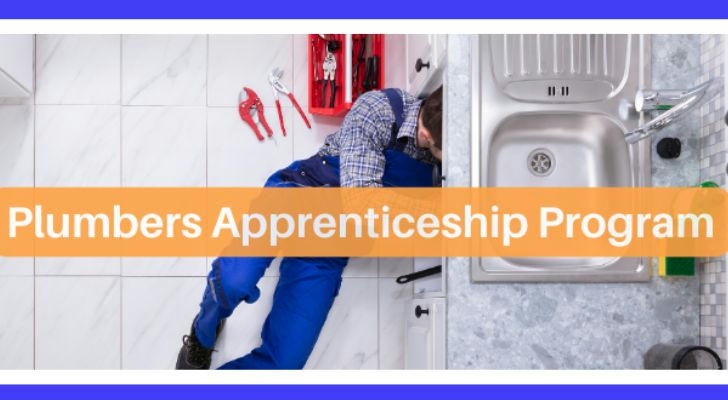Plumber Training Courses: Government-Supported, Paid Apprenticeships
Kickstart your plumbing career with government-backed plumber training programs that let you earn while you learn. These beginner-friendly courses require no prior experience, making them ideal for career changers and first-time job seekers. During training, you can earn $18–$25/hour, gaining hands-on experience while building your income. These programs offer national certification, preparing you for a stable and well-paid long-term career.
Keep reading to discover the best options for certified plumber training and job placement!

🔧 Why Choose a 【Paid Plumber Training Program】?
✅ Get Paid to Learn Plumbing
Unlike many other trades, plumbing offers paid apprenticeships—you start earning from day one. According to the U.S. Bureau of Labor Statistics, entry-level apprentices earn $18–$25 per hour.
✅ Beginner-Friendly: No Plumbing Experience Required
Courses are open to those with zero background in plumbing, making them ideal for anyone changing careers or entering the workforce.
✅ High Demand for Certified Plumbers Across the U.S.
The plumbing industry is projected to grow by 6% through 2033, adding over 43,300 new jobs nationwide (BLS).
✅ Earn a Nationally Recognized Plumbing Certification
Upon completion, you'll receive industry-recognized credentials that significantly increase your job opportunities.
✅ Backed by Government & Institutions
Many programs are government-supported, ensuring high quality and strong job placement partnerships.
🔍 Top-Rated 【Paid Plumber Apprenticeship Options】
1️⃣ On-the-Job Paid Plumbing Apprenticeships
- Hourly Pay While Training: $18–$25/hour under licensed plumbers
- Program Duration: Typically 4–5 years with wage increases
- Certification: Become a Journeyman Plumber
2️⃣ WIOA-Supported Plumbing Training Programs
- Eligibility Based on Income: Tailored for veterans, unemployed workers, and job seekers
- Financial Support: Covers materials, safety gear, exams
- Extra Services: Resume workshops, career fairs, job placement help
- Where to Apply: Local American Job Centers across the U.S.
3️⃣ Community College Plumbing Programs
- Blended Format: Online theory + in-person labs
- Fast Certification: Earn your plumber certificate in 6–12 months
- Career Connections: Includes internships and employer partnerships
- Funding Options: Apply for federal grants or employer reimbursement
📋【Plumber Course Requirements & How to Apply】
Basic Qualifications
- 18+ years old
- Legal work authorization
- High school diploma or GED
Recommended Audiences
- Veterans
- Workers aged 25–45
- Career changers
📌 Application Steps
1️⃣ Visit your local American Job Center or plumber program website
1️⃣ Submit a simple form with ID and eligibility proof
1️⃣ Complete an assessment or interview
1️⃣ Start your paid training and attend scheduled classes/work hours
🛠️ Other Plumbing Certification Options
Nonprofit organizations and local agencies also offer hands-on plumber training, often paired with internships.
Examples:
- Habitat for Humanity
- Urban League job-readiness plumbing programs
🌟 Success Story: Career Change Through Plumber Training
Jason, 32, former delivery driver
He enrolled in a WIOA-supported plumber course through his local job center. With no prior experience, Jason completed a 12-month training program and landed a job paying $25/hour. Within one year, he was promoted to crew supervisor, earning over $70,000 annually.
🧰 What Does a Plumber Do?
- Install and repair piping systems
- Inspect and test plumbing systems for safety
- Interpret blueprints and local building codes
- Communicate with customers about issues and solutions
- Maintain service logs and records
📊【Recommended Training Paths by Age Group】
| Age Group | Best Plumber Program Type | Duration | Key Benefits |
|---|---|---|---|
| 18–25 | Community College + Apprenticeship | 12–24 months | Flexible schedule, strong foundation |
| 26–35 | WIOA-Supported Apprenticeship | 24–48 months | Structured learning, income growth |
| 36–50 | Fast-Track Plumbing License | 6–12 months | Quick transition, higher pay |
| 51–65 | Weekend or Part-Time Courses | Flexible | Great for upskilling or semi-retirement |
🔧 Frequently Asked Questions About Plumber Training Programs
1. I have no experience—can I still enroll in a plumber training course?
✅ Yes! Most plumber training programs are beginner-friendly and require no prior experience. All you need is to be 18+ years old, have legal work authorization, and hold a high school diploma or GED.
2. Do I really get paid during training?
✅ Yes. If you enroll in a paid apprenticeship or WIOA-supported program, you’ll earn while you learn. Starting wages typically range from $18 to $25 per hour, with steady increases as you gain experience.
3. How long does the training take?
🕒 Training duration varies depending on the program type:
- Fast-track certification: 6–12 months
- Community college + internship: 12–24 months
- Full apprenticeship: 4 years (with rising pay over time)
4. I’m in my 30s—am I too old to become a plumber?
✅ Not at all! Many plumbers enter the trade in their 30s or 40s. In fact, WIOA programs often prioritize adults between 25–45 looking for career changes or reentry into the workforce.
5. Is the schedule flexible? Can I train part-time?
⏰ Many programs offer evening or weekend classes, especially through community colleges or nonprofit organizations. These flexible schedules are perfect for those balancing work or family responsibilities.
6. Will I get a job after completing the program?
🎯 Most government-backed and apprenticeship programs include job placement assistance, internships, or employer partnerships. The plumbing industry is in high demand, offering strong job stability.
🚀 Start Your 【Government Support Plumbing Career Training】 Today!
Becoming a plumber means more than fixing pipes—it’s about building a respected trade career with government support, stable income, and strong growth potential.
Whether you're just starting out, switching careers, or upgrading your skills, now is the perfect time to begin your journey.
Take action today, explore local programs
